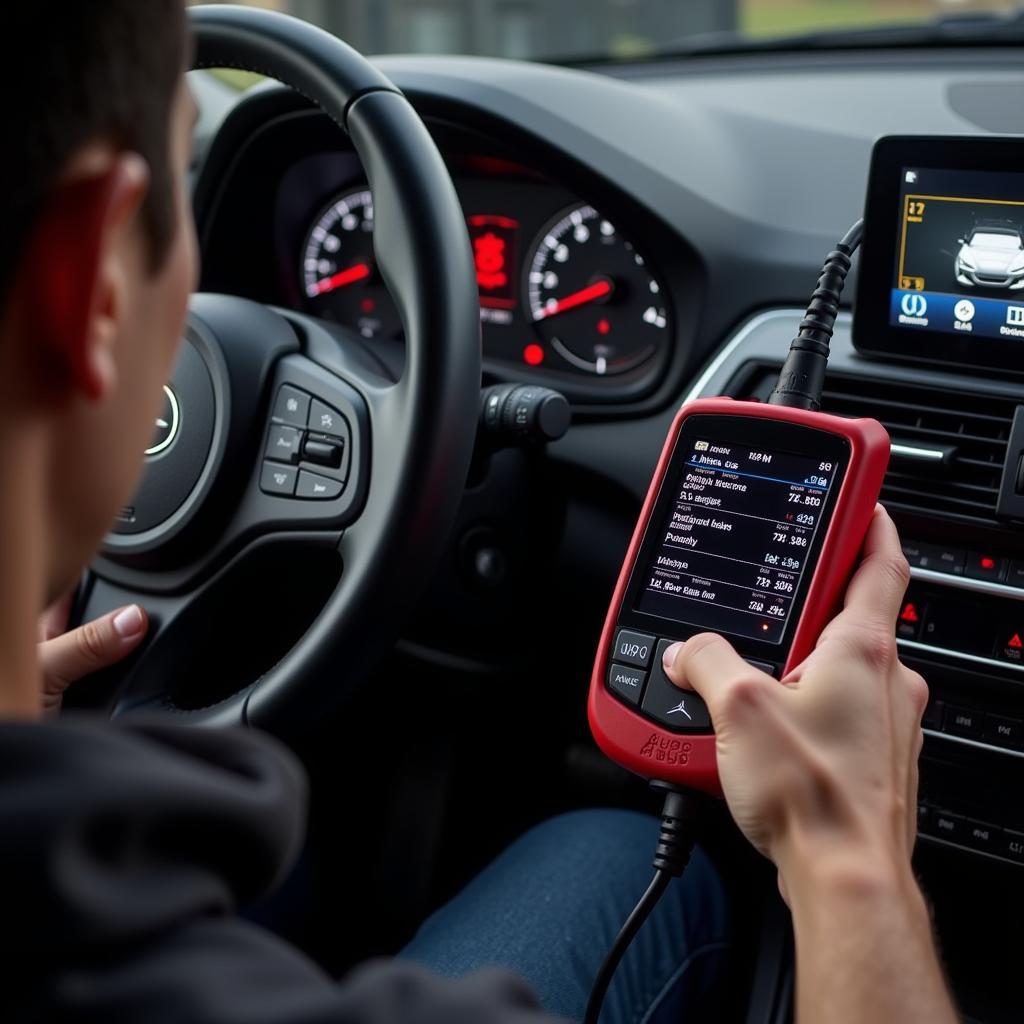If your car noise during acceleration sounds like a power tool, it’s a sign something needs attention. Don’t ignore it! This sound can range from a high-pitched whine to a grinding roar, and understanding its potential causes can save you time, money, and potential headaches down the road. Let’s explore the common reasons for this annoying, and often concerning, car noise.
Decoding the Power Tool Symphony Under Your Hood
Hearing a power tool sound when accelerating is rarely a good sign. It often indicates issues ranging from minor annoyances to serious mechanical problems. Identifying the specific type of power tool sound can help pinpoint the culprit. Is it a whirring like a drill, a grinding like a sander, or a whining like a saw? Each sound offers clues. Check out our car noise diagnosis tool for more help.
Common Culprits Behind the Racket
Several components can contribute to this unsettling noise. A failing alternator often produces a whining sound, particularly noticeable during acceleration when the electrical load increases. Loose or worn belts can squeal or chirp, mimicking the sound of a power tool, especially on cold starts or during acceleration. Power steering issues can also create a whining sound during acceleration, particularly when turning the wheel.
Exhaust leaks can manifest as a hissing or roaring sound, resembling a power tool, especially under acceleration. Issues with the differential, particularly in rear-wheel or all-wheel drive vehicles, can generate a whining or humming sound that intensifies with speed and acceleration.
Is it a Drill, Sander, or Saw? Pinpointing the Problem
The specific type of power tool sound can narrow down the possibilities. A whirring noise similar to a drill might indicate a problem with the alternator or power steering pump. A grinding sound like a sander could suggest worn brake pads, loose belts, or issues with the transmission. A high-pitched whine resembling a saw might indicate a problem with the differential or transfer case.
 Car Acceleration Noise Diagnosis
Car Acceleration Noise Diagnosis
What to Do When Your Car Sounds Like a Workshop
If you notice this noise, don’t panic, but don’t ignore it either. First, try to pinpoint the type of sound and when it occurs. Does it happen only during acceleration, or at specific speeds? Does it change when turning or braking? These details can be crucial for diagnosis. Next, schedule an inspection with a qualified mechanic. They have the tools for noise in car and the expertise to diagnose and address the issue effectively.
Professional Diagnosis: Your Best Bet
While some basic troubleshooting might be possible, professional diagnosis is highly recommended. A mechanic can use advanced car diagnostic test addiscombe to pinpoint the source of the problem. Ignoring the noise can lead to more extensive and costly repairs down the line.
“Addressing these noises early on is crucial,” says automotive expert, David Miller. “What starts as a minor annoyance can quickly escalate into a major repair if left unchecked. Regular maintenance and timely diagnostics are key to preventing costly breakdowns.”
Conclusion: Don’t Let Your Car Serenade You with Power Tool Sounds
A car noise during acceleration that sounds like a power tool is a warning sign. From a failing alternator to a worn differential, various issues can cause this unsettling sound. Prompt diagnosis and repair are essential to prevent further damage and ensure your safety on the road. Ignoring the problem can lead to costly repairs and potentially dangerous driving conditions. Don’t delay, get it checked out! You can find reliable car engine diagnostic craigieburn services to help pinpoint the issue and get you back on the road quickly and safely.
FAQ
- What are the most common causes of a power tool sound during acceleration? Alternator, belts, power steering, exhaust leaks, and differential issues.
- Should I drive my car if it’s making this noise? It’s best to have it inspected by a mechanic as soon as possible.
- Can I fix this problem myself? While some basic checks are possible, professional diagnosis is recommended.
- How much does it cost to fix this issue? The cost varies depending on the cause and the extent of the damage.
- How can I prevent this noise in the future? Regular maintenance and timely inspections are key.
- What kind of tools are used to diagnose this issue? Mechanics use specialized car diagnostics basingstoke equipment to pinpoint the problem.
- Is it dangerous to ignore this noise? Yes, ignoring the noise can lead to further damage and potentially unsafe driving conditions.
Common Scenarios
- Whining noise when accelerating and turning: This could indicate a power steering issue.
- Grinding noise during acceleration and braking: This might suggest worn brake pads or other brake system issues.
- High-pitched whine that increases with speed: This could point to a problem with the differential.
Further Exploration
For more information on car noises and diagnostics, check out our other articles on car maintenance and troubleshooting. We also have resources on finding qualified mechanics in your area.
Contact us for any assistance. WhatsApp: +1(641)206-8880, Email: [email protected] or visit us at 910 Cedar Lane, Chicago, IL 60605, USA. Our customer service team is available 24/7.

Leave a Reply